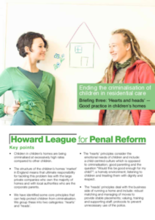Displaying 621 - 630 of 1482
This study aimed to compare the rates of psychiatric diagnoses and criminal convictions in young adulthood (ages 18–25 years) among children who were first placed at ages 2–6 years with those of children who were not placed and who had similar sociodemographic and family characteristics.
This chapter elaborates on the specifics of these two limbs of Article 37 Convention on the Rights of the Child, the core human rights provision for the protection of children deprived of liberty.
This article explores the impacts of two common forms of early childhood adversity, maltreatment and placement in institutional care, on children's behavioral, psychiatric, and physical health into adulthood.
This study explored how organizational structure (dormitory vs family unit) and funding sources (government vs private) influence the work and health of individuals employed as caregivers in children’s homes in Ghana.
This mixed methods study examined elements of effective implementation and the effectiveness of an incentive program piloted in a group home serving adolescent boys.
The aim of this study was to assess the nutritional status of children residing at an orphanage.
This chapter from Residential Child and Youth Care in a Developing World: Global Perspectives focuses on the institutional care of children and young people deemed ‘at risk’ according to current Malaysian law on child welfare: Malaysian Child Act (2001).
This briefing paper is part of a series from the Howard League that explores some core principles to help protect children in residential care in the UK from criminalisation.
This animated video from Forget Me Not and The Umbrella Foundation, tells the story of a young child placed in an orphanage and highlights the pain and trauma of family separation, the impacts of a revolving door of volunteers on children in institutions, and the ways in which volunteering fuels the orphanage industry.
The objective of the study was to assess the knowledge and practices regarding menstrual hygiene among adolescent girls residing in selected orphanages of Haryana.

